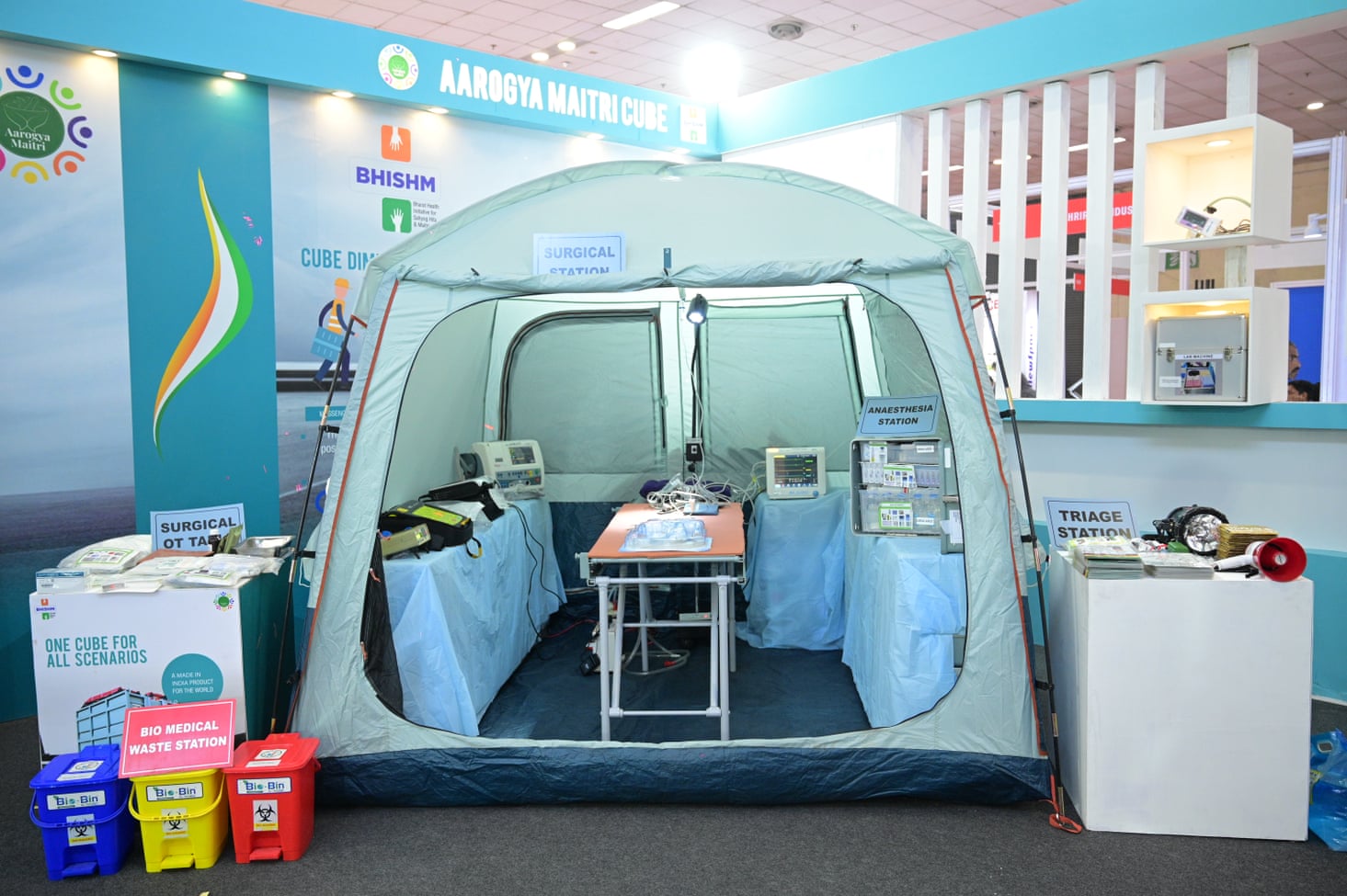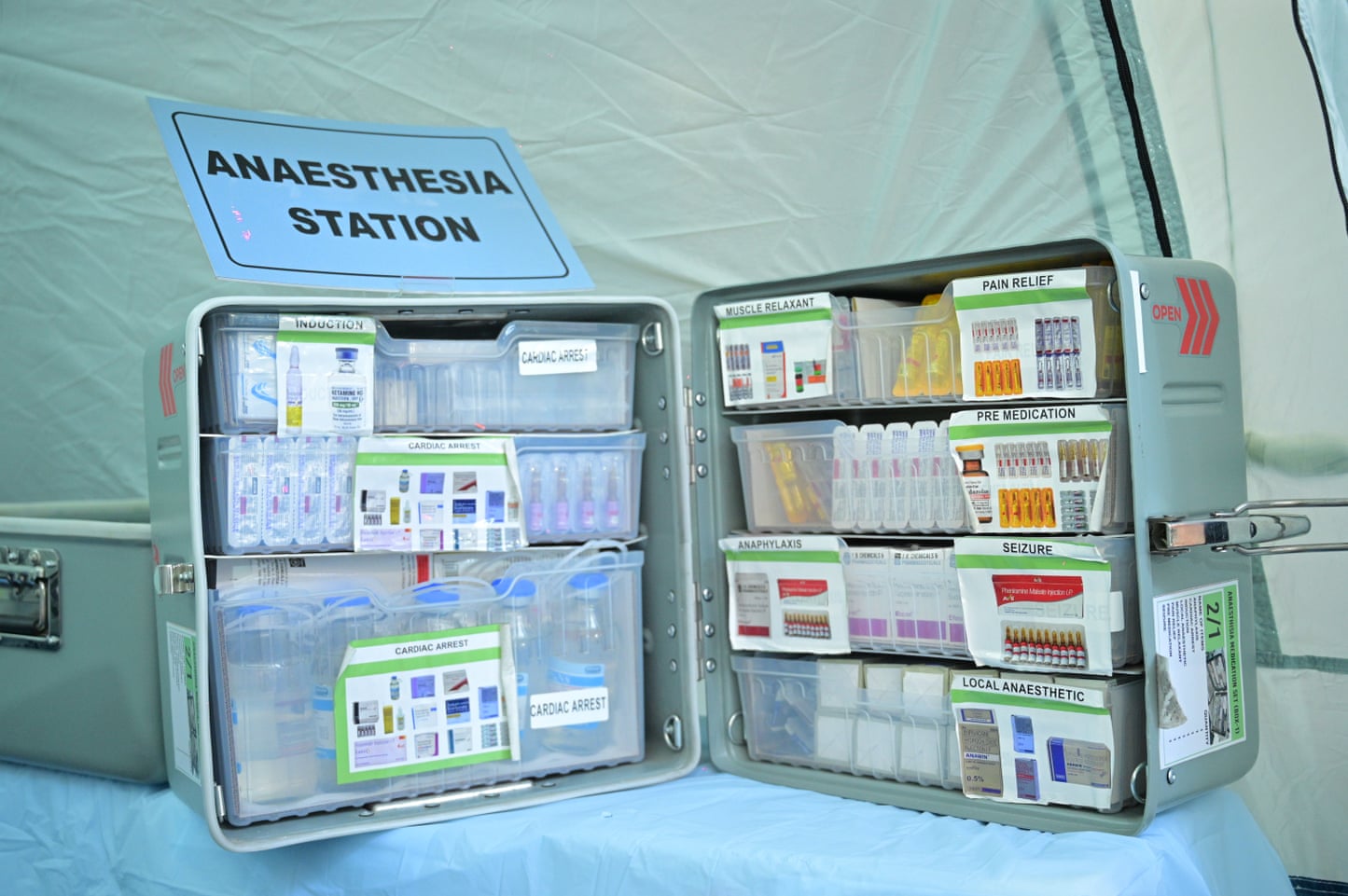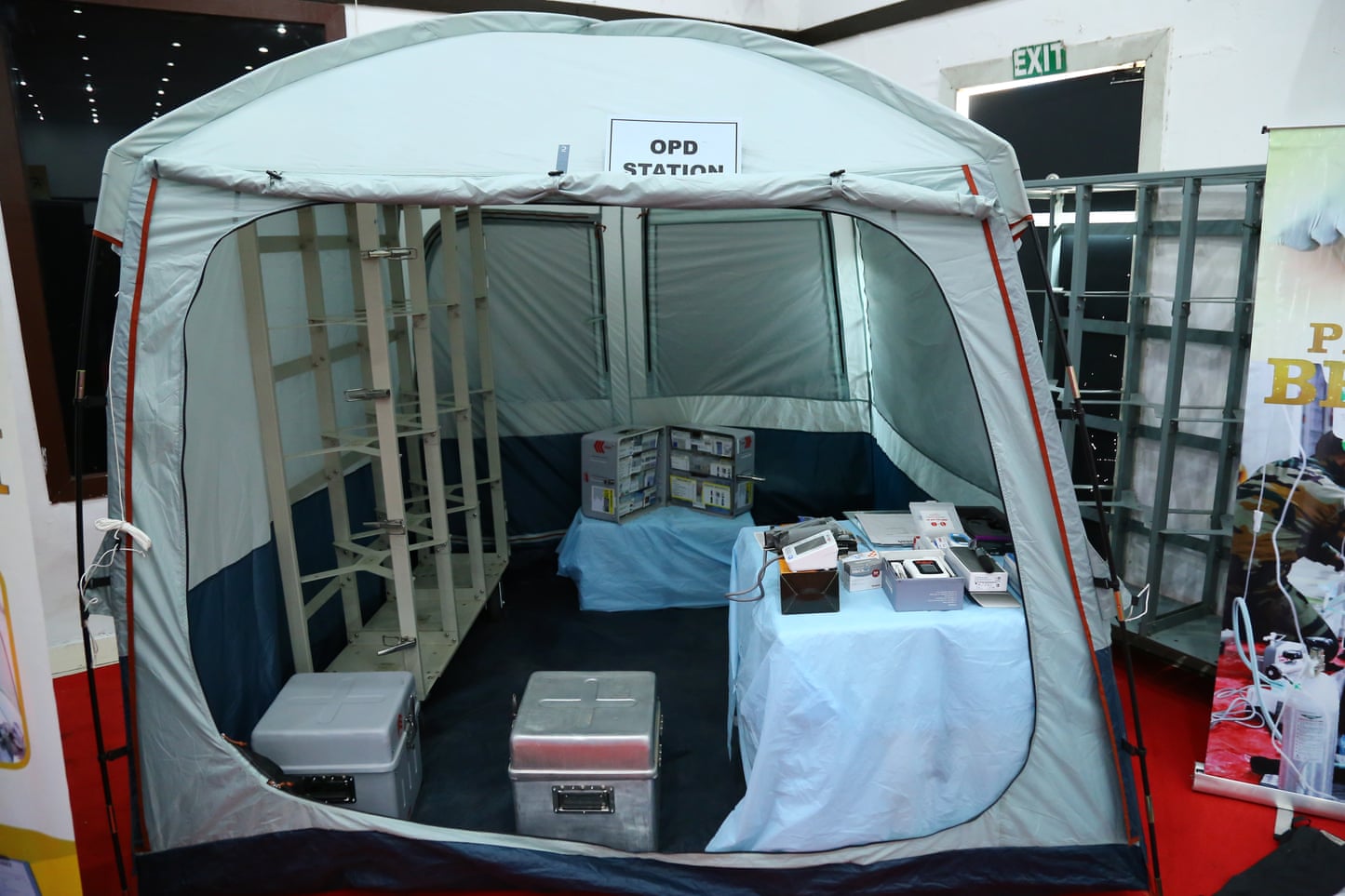https://www.theguardian.com/global-...field-hospital-for-remote-disaster-zonesIndia unveils flatpack field hospital that can be airdropped to disaster zones
The portable unit, comprising mini cubes of medical equipment, enables surgeons to be operating within an hour, designers claim

The operating theatre of the portable hospital developed by India’s health ministry. It includes a mini X-ray and ultrasound, powered by a solar-charged generator. Photograph: HLL Lifecare
Amrit Dhillon in Delhi
Fri 8 Dec 2023 00.00 EST
India has designed and built a “flatpack” field hospital that can be flown to a disaster area by helicopter and assembled faster than an Ikea bookcase.
The hospital is contained in 72 small waterproof cubes, each weighing under 15kg and measuring 38cm x 38cm x 38cm (15 x 15 x 15in). They are packed with tents and specially designed medical equipment.
The cubes can be transported to war zones or the sites of natural disaster such as floods and earthquakes in remote areas, and are tough enough to withstand being airdropped from a plane or helicopter.
It takes five trained people one hour to assemble the cubes into a fully functional hospital for doctors to treat injuries and perform life-saving surgery. Each is equipped to treat up to 200 patients.
India’s health ministry said: “It can provide critical medical care, making it a lifeline in remote and tough terrains where immediate medical attention is needed.”

An anaesthesia pack for the hospital, with drugs for conditions such as heart attacks and seizures. Photograph: HLL Lifecare
The Aarogya Maitri Aid Cube hospital, officially launched this week, has small intensive-care units, an operating theatre and a range of equipment including portable X-ray and ultrasound machines and ventilators. It is powered by a generator charged by solar panels, and comes with water and a cooking station.
The hospital is part of an ambitious healthcare project initiated by the Indian prime minister, Narendra Modi, to support low-income countries affected by natural disasters.
The cubes’ versatility and how they can be configured is lauded by HLL Lifecare, the state-owned company behind their design.
Dr Ankita Sharma, a consultant with HLL Lifecare, said: “If the immediate need at the site is for life-saving surgery, then the operating theatre can be assembled first. This takes just 10 minutes. The doctors can start surgery while the remaining cubes are assembled.”
While the contents of 60 cubes are mandatory, the contents of the remaining 12 can be modified to suit different situations.
“If it’s an earthquake where you get lots of fractures, then you pack in more cubes containing equipment for bone injuries and remove some of the bleeding injury kits needed for soldiers with bullet or bomb injuries,” she said.
Sharma said it took a year of working with doctors, army medics, engineers and designers to come up with the blueprint.

The field hospital’s ‘outpatient department’. A miniature X-ray was designed so it could fit into the small cubes. Photograph: Courtesy of HLL Lifecare
The hospital had to be small and light, which meant equipment had to be reduced in size and constantly weighed to check a helicopter could take the load.
“One of the biggest challenges was designing the X-ray machine to be smaller but we did that. But then the plate was too big. That too had to be manufactured afresh in a smaller size,” said Sharma.
Each cube is waterproof and corrosion-proof. They have been dropped from helicopters and drones to test for resilience.
A tablet computer included in the cube pack is programmed to minimise assembly errors, and an alarm sounds if the wrong equipment is put in any given cube. An app also helps users to quickly locate items in the cubes, monitor their usage and expiry dates, and ensure they are ready for subsequent deployment.
Sharma says the hospital is the first of its kind in India, but is reluctant to make any grander claim as she is not certain of similar developments in other countries.
“The hospital is a small contribution by India to humanitarian work around the world,” she said. “We are now ready to share it with any country that needs it.”
The government has given a set of the cubes to Sri Lanka and Myanmar.
India unveils flatpack field hospital that can be airdropped to disaster zones
The portable unit, comprising mini cubes of medical equipment, enables surgeons to be operating within an hour, designers claim

The operating theatre of the portable hospital developed by India’s health ministry. It includes a mini X-ray and ultrasound, powered by a solar-charged generator. Photograph: HLL Lifecare
Amrit Dhillon in Delhi
Fri 8 Dec 2023 00.00 EST
India has designed and built a “flatpack” field hospital that can be flown to a disaster area by helicopter and assembled faster than an Ikea bookcase.
The hospital is contained in 72 small waterproof cubes, each weighing under 15kg and measuring 38cm x 38cm x 38cm (15 x 15 x 15in). They are packed with tents and specially designed medical equipment.
The cubes can be transported to war zones or the sites of natural disaster such as floods and earthquakes in remote areas, and are tough enough to withstand being airdropped from a plane or helicopter.
It takes five trained people one hour to assemble the cubes into a fully functional hospital for doctors to treat injuries and perform life-saving surgery. Each is equipped to treat up to 200 patients.
India’s health ministry said: “It can provide critical medical care, making it a lifeline in remote and tough terrains where immediate medical attention is needed.”

An anaesthesia pack for the hospital, with drugs for conditions such as heart attacks and seizures. Photograph: HLL Lifecare
The Aarogya Maitri Aid Cube hospital, officially launched this week, has small intensive-care units, an operating theatre and a range of equipment including portable X-ray and ultrasound machines and ventilators. It is powered by a generator charged by solar panels, and comes with water and a cooking station.
The hospital is part of an ambitious healthcare project initiated by the Indian prime minister, Narendra Modi, to support low-income countries affected by natural disasters.
The cubes’ versatility and how they can be configured is lauded by HLL Lifecare, the state-owned company behind their design.
Dr Ankita Sharma, a consultant with HLL Lifecare, said: “If the immediate need at the site is for life-saving surgery, then the operating theatre can be assembled first. This takes just 10 minutes. The doctors can start surgery while the remaining cubes are assembled.”
While the contents of 60 cubes are mandatory, the contents of the remaining 12 can be modified to suit different situations.
“If it’s an earthquake where you get lots of fractures, then you pack in more cubes containing equipment for bone injuries and remove some of the bleeding injury kits needed for soldiers with bullet or bomb injuries,” she said.
Sharma said it took a year of working with doctors, army medics, engineers and designers to come up with the blueprint.

The field hospital’s ‘outpatient department’. A miniature X-ray was designed so it could fit into the small cubes. Photograph: Courtesy of HLL Lifecare
The hospital had to be small and light, which meant equipment had to be reduced in size and constantly weighed to check a helicopter could take the load.
“One of the biggest challenges was designing the X-ray machine to be smaller but we did that. But then the plate was too big. That too had to be manufactured afresh in a smaller size,” said Sharma.
Each cube is waterproof and corrosion-proof. They have been dropped from helicopters and drones to test for resilience.
A tablet computer included in the cube pack is programmed to minimise assembly errors, and an alarm sounds if the wrong equipment is put in any given cube. An app also helps users to quickly locate items in the cubes, monitor their usage and expiry dates, and ensure they are ready for subsequent deployment.
Sharma says the hospital is the first of its kind in India, but is reluctant to make any grander claim as she is not certain of similar developments in other countries.
“The hospital is a small contribution by India to humanitarian work around the world,” she said. “We are now ready to share it with any country that needs it.”
The government has given a set of the cubes to Sri Lanka and Myanmar.